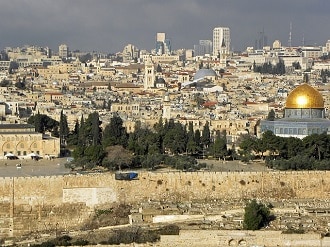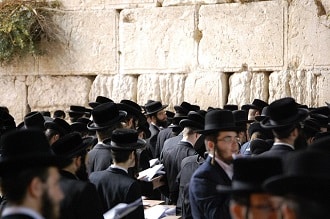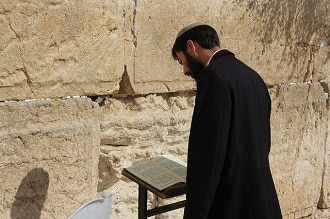Given at the Interfaith Climate and Energy Conference, March 19th, 2012, Jerusalem
Rabbi Ronen Lubitch is the spiritual leader of Nir Etzion which is situated in the northern Carmel region of Israel. Rabbi Lubitch lectures at the Academic College for Education, Sha’anan and at Haifa University. He is an alumnus of Lifshitz College having earned his Bachelor in General Philosophy and in Jewish Philosophy and his Master’s Degree in Religious Studies and Jewish Thought. He served as a community Rabbi in Cape Town, South Africa, as a lecturer in the Religious Studies department and as Campus Rabbi at Cape Town University. Rabbi Lubitch is a member of the Tzohar Rabbinic Organization, is a founding member of “Beit Hillel” and is a Member of the Board at the Israel Union for Environmental Defense.

Translated from Hebrew to English by Shammai Fishman
I wish, first of all, to express my appreciation and gratitude to Mr. Michael Mertes and Rabbi Neril. For the past 25 years I have been involved in matters of interfaith dialogue and the environment and this is the first time that I have the privilege of attending a conference which combines these two topics. I believe that this combination is very effective because the topic of our common faith is highly influential and could become a very strong force in the field of protecting the environment, while the topic of environment could be very powerful in forming an interfaith link around a topic that everyone should and could unite around.
Modern ecological thought recognizes two approaches: Anthropocentric ecology and biocentric ecology. Anthropocentric ecology puts man in the center, stating that man is the most chosen of the creations, the crown of creation and above all. As Sheikh Muhammad Amara put it a few minutes ago “all was created for the sake of man.” The biocentric approach is that man is not above all, there is no hierarchy in creation and man is just one of the components of the world. He, therefore, is supposed to integrate into the world and not view himself above any of the creations. I think that biocentric thought can not coincide with religious thought, because all of our three religions perceive man as the master piece of creation. We find within Jewish religious thought approaches which give more power to man and more authority and more rights in the activities of man in the world.
We can find approaches which tell man to be more modest and humble and to be much more careful in his relationship to the entire world. It would be enough if I mentioned for example that since the matter of the creation of man was mentioned, that man was created at the end of the creation process. The Mishnah in the Talmud in tractate Sanhedrin asks ‘why was man created at the end?’, and provides a few answers. One answer, for example, states that man was created at the end because he is the most important and that is, therefore, the reason why the creator created the entire world first. He prepared everything for man and then brought man who is the essence. Another approach states that man was born at the end so that he should not feel pride. Or in the language of the Mishnah: “so he shall not be in a state of euphoria”, and that way he will know that he is evidently at the end.
The world existed before him, or as the Mishnah states: “even the mosquito, the fly, preceded you. So you should not feel that you are more important than the other animals.” We have here two different approaches. The first approach emphasizes the importance of man and his special status. The second approach chooses to emphasize especially that man should not perceive himself as being above the other creations. Therefore, if I had enough time, I could have continued to show you these approaches in the Bible and in the Talmud, in Jewish philosophy, over the generations; these two approaches and nuances through many writings of Jewish sources.
The anthropocentric approach usually is more central in religious thought, and it frequently causes religious people, especially, to be less careful with regard to the environment. This comes from the thought that the topic of the environment belongs to “them”– the Green, the leftists, the non-religious who do not have a G-d so that is why they are involved with the environment. The claim which I wish to present to you today is that the complete opposite is true. The complete opposite.
In addition to the anthropocentric and the biocentric approaches I wish to suggest a third approach. That is the “Theocentric” approach. G-d is at the center.And it is precisely because of my faith in G-d that I believe in the importance of protecting the environment, and the responsibility and obligation of humans and humankind to be concerned with protection of the environment. Because, out of the belief in a Creator, I understand very well how much each and every thing in the world possesses infinite importance – importance that I cannot know or measure, since I can not enter into the mind of The Creator of the world. If he created this insect, this animal, this plant, then it must have some role. And Maimonides, in his great philosophical book, The Guide for the Perplexed, states: “It is an error to think that everything in the world was created for the sake of man. There are things which have other roles and purposes, which we do not understand.” But the fact that I do not understand does not mean that everything was created for my sake. It is possible that things were created for the purpose of other things, in a different way. Nowadays, we are aware of the astonishing ecological diversity that exists in the whole world, a vast part of which exists in places that are not inhabited by humans. For example, there are many hundreds of species of animals and plants in one rainforest in South America, in the forests of the Amazon. There are hardly any people there, but still these species are found there and only there. From this, we can better understand Maimonides’ words. Therefore, it seems to me that precisely from a religious perspective, that believes in a Creator, and puts the Creator at the center, we could be much more obligated and take on much more responsibility for protecting the environment, and to be more concerned with problems stemming from related phenomena, that are relevant to sustainability, our culture, and our lives.
And here I reach what I see as the core of the religious message:
The biggest problem of our time is consumption, consumerism. Already 250 years ago, the economist Malthus , said that there is a problem, and that, over time, humankind will have a problem with population growth; that the population would double, and that there would not be enough resources for everyone. He said that already 250 years ago, although he did not fully know the implications of what he was saying. Because in the past 30 years, just the past 30 years, the world’s population has doubled, while consumption has grown eightfold. And the problem of consumption is a great and severe problem facing the world today.
We speak often about recycling, and of course recycling is very important. But according to research conducted in Britain, the waste generated by private households [of which some can be recycled]is only six percent of the 360 million tons of garbage created in Britain annually. The rest is created by industry. Industries are growing and producing more and more. They are causing problems of exploitation of weak groups of society, which should be of concern to us as people and especially as people for whom faith is important. Beyond that, there are very difficult environmental issues, of pollution of ground water, problems of creating a lot of waste, and many more problems that are caused by consumption. And I think that regarding this issue, the religious world has some very important messages to bring to the world.
Religious thought is based on the belief that man should consume what he needs , that he will know when to restrain himself, that he will know how to limit the use of things that he does not need, and that he will know to use [resources] properly, to use things for a benefit and not to seek out more and more things for luxury. I think that the correct use of ideas regarding preserving the environment could benefit religious education on moderation, and that religious education on moderation and restraint could serve to benefit, and activate ecological and environmental thought. I will provide an example from within the Jewish tradition.
You know, in many places around the world they sometimes organize a “buy nothing day,” a day without shopping or a day without using cars, for one day in the year. They make a big campaign and try to make it so that there will be one day of the year on which people will not buy things. And the shopping malls are full just like everyday. Sales people at the malls report that there is no decrease in sales. Or a day without riding in acar , one day of the year, but the traffic jams on the way to work and back are the same traffic jams. We in Judaism have a day of the week which is a “buy nothing day” and a day of the week without travel, and it has worked for thousands of years. An entire day and night, — not just the daytime. And it works. Because it puts the Creator as the establisher of this day. In other words, precisely because of our recognition of the Creator we are more able to generate ecological education. To be concerned about and take responsibility for the environment. And this example of the Sabbath is just one out of many.

When I speak, for example, about the Festival of Booths (Sukkot), I always stress that beyond the standard ideas about the Festival of Sukkot, it teaches us a lot about the need to recycle. We take pieces of wood, which are not being used for any purpose, and build aSukkah with them. We take pieces of cloth which are not being used for any purpose, and use them to build. At the Temple [in Jerusalem] they would have the “Simchat Beit HaShoeva” (Rejoicing at the Place of the Water-Drawing)on the Festival of Sukkot. They would take all the priests’ clothes which had worn out and make wicks for the Menorah and for all the candles that they would light at that celebration.
These are a few examples that show that within the regular daily religious commandments, we can find, beyond the well known ideas, (of course I am not sayingthat [the environmental messages I presented] are the reason for the commandments of Shabbat or Sukkot), but rather, that beyond the deep existing reasons for the commandments of Shabbat and Sukkot, today in the modern world we can find new ideas that directly address the ecological problems in which we live. The Talmud gives a story about Rabbi Yehuda HaNasi, one of the greatest political and religious leaders of the Jewish people of the second century CE. He was very ill, and the medics at the time said that he must drink a special wine, made out of apples which had been preserved for 70 years. So they asked each other “how can we get this wine?” At the end they found a non-Jewish man who had that wine. Rabbi Yehuda HaNasi drank and became healthy. And then he recited a blessing, “Blessed is He who gave his world to guardians.” Rabbi Yehuda HaNasi defined here the role of man.
The role of man is to be a guardian of creation. When man was created and G-d put him in the Garden of Eden, as the Torah says in the book of Genesis chapter 2: That He put the human being in the Garden of Eden “to work it and to guard it”, and indeed, we were supposed to be in the Garden of Eden until today (there was some problem and we were ejected.) But man was supposed to stay in the Garden of Eden had he not sinned. And what was his role? To work it and to guard it. To work and to guard what had been created. This is the religious message about the role of man: as responsible for managing the environment around him.
Nowadays, we find ourselves in a situation of extraordinary resource exploitation. According to a United Nations’ report from three years ago, by the year 2025, two thirds of the world will have water shortages. The definition of a water shortage is that the population consumes 120% of its water, that is, 20% more water than is available. And this situation is constantly growing. We shrink our resources, we cut down forests, and we know how much we depend on the symbiotic relationship between plants and animals. We consume more and therefore we produce more, and therefore we deplete the ozone layer, and cause other significant ecological damage. We know today about real problems in which the human being is cutting off the branch upon which he is sitting. Therefore, it seems to me, we should utilize every religious idea and world view which can support ecological thinking, because this is what our times demand. This is not a thought only for people who are bored and have nothing to do, as people used to think many years ago. When the first book about humans causing damage to the environment was published in the United States in 1962 (on the topic of marine zoology), people did not even understand what it was talking about. Today we understand very well.
I wish to conclude with the Midrash, mentioned in Ecclesiastes Raba, from the third century CE, in which the sages speak about a verse from the Book of Ecclesiastes. There in the Book of Ecclesiastes it says that people should be careful, “to see the deeds of people, and how to fix where they erred”. The Midrash say on this, “At the hour that G-d created man”, exactly when He created him, “He took him and showed him all the trees of the Garden of Eden,” He took him for a stroll around his surroundings, “And He told him: See my works how beautiful and praiseworthy they are”, look around and be sure not to be apathetic. Look at your surroundings, look at the nature, look at the world in which you live, and see its quality and its beauty. “Make it your priority not to ruin and destroy My world,” You must make it your priority, because if you will not make it your priority you will ruin things. “To make it your priority” in our times also means to legislate, to speak about the matter in synagogues, mosques churches, to write about it in the newspaper. “Make it your priority” — make a conference– “so you do not ruin and destroy My world.” “Because if you ruin things, there is nobody who can fix it after you.” Our sages, close to 2,000 years ago, understood what is hard for people nowadays to grasp, that people have the power to ruin the world.
The Creator created the world, but as Rabbi Neril put it so nicely at his opening statement, “It is all in your hands,” everything depends on us. Whether the bird that the boy held in his hand will die [by being crushed] or will fly away, that is all in our hands. Man has free choice whether to ruin and destroy the world. If mankind will not understand that there is an existential call which we must mobilize around, that we must act together on, that we must unify people of different religions and ethnicities, then we really are prone to ruin and destroy the world. Real belief in the Creator obligates us to respect anything that the Creator created. Genuine belief in the Creator obligates us to mobilize for the sake of the preservation of our world. Both on a social and an environmental level, of physical preservation of the world in which we live. Of course I agree, with the words of the first speaker Archbishop Elias Chacour, that we must provide also for the spiritual level. But our duty toay is not only in the spiritual level, in which each of us usually speaks to his friends and co-religionists, but our mission is to mobilize as one human unit for the sake of Tikun Olam (repairing the world) in all of its aspects. Thank you very much.

ICSD works on a global basis, with current engagement in Africa, the Middle East, North America, and Europe.
